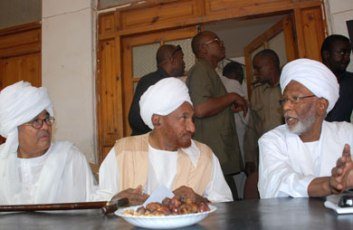Sudan’s NUP denies withdrawing from opposition coalition
October 9, 2013 (KHARTOUM) – The leaders of opposition parties that are members of the National Consensus Forces (NCF) concluded a meeting on Monday by approving of a plan to form a joint operations room that would work on mobilizing people until the regime is toppled.

In a related issue, the deputy chairman of the National Umma Party (NUP) Major General M. Fadlallah Burma Nasser denied in an interview with Sudan Tribune reports about the party’s withdrawal from the alliance.
“This alliance is our making so why would we withdraw and where will we go?” Nasser said.
The NUP official explained that the remarks he delivered at the meeting were misinterpreted and emphasized that it was simply an explanation of the reasons that prompted the NUP chief al-Sadiq al-Mahdi to boycott the Monday meeting.
Nasser stressed that nothing he said made any reference to pulling out but listed certain reservations that focused on reforming the NCF so that it emerges as a true leader to the protests that started earlier this month adding that no work can materialize without planning and follow-up .
The NUP he said was unhappy about the manner by which the Monday summit was called for. He criticized other parties for not attending a commemoration for victims of the recent protests and ignoring their call for a workshop on restructuring the NCF.
He also noted that the NUP was not invited to two meetings before.
The head of the New Forces Movement (NFM) Hala Abdel-Halim concurred with Nasser that NUP did not withdraw from the alliance as was widely reported.
She said that the three hours meeting underscored the need to sign off on the draft Constitutional Proclamation and make it public as it would be the guiding document on the post-regime period.
Abdel-Halim, however acknowledged that the NUP and the Popular Congress Party (PCP) of Hassan al-Turabi have certain reservations on the draft which needs to be addressed and resolved to reach an agreeable format.
The opposition figure went on to say that the opposition forces are now more cohesive than they were ever before and credited the recent protests for that saying that they added pressure on the alliance to become more united.
Abdul Halim predicted that more popular anger will erupt in light of the difficult economic situation.
On Tuesday the alliance issued a statement stressing the need to coordinate and strengthening ties with the rebel Sudan Revolutionary Front (SRF). The latter consist of Darfur rebel movements and Sudan People Liberation Movement North (SPLM-N) which is fighting government troops in South Kordofan and the Blue Nile states.
The two sides however are in disagreement over the future government system and means to oust the regime whether political or military.
Many observers downplay the impact of the NCF and the opposition parties generally on the political landscape.
They point out to the clashing ideologies and priorities along with deep mistrust that runs among them since decades.
(ST)
